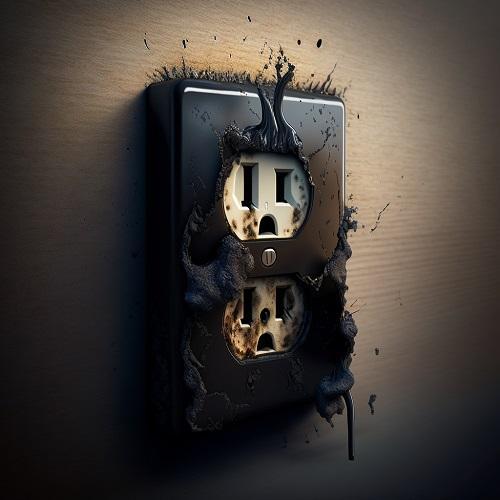Electricity is an essential part of our daily lives, but it can also be dangerous if not handled properly. Here are 10 electrical safety tips to help keep you and your home safe:
1. Use caution when using electrical appliances: Electrical appliances can be a source of danger if not used properly. Always unplug appliances when not in use and avoid using appliances with frayed or damaged cords. This will prevent electrical fires and protect you from electrical shocks. It’s important to check for any signs of wear and tear on the cords of your appliances and replace them immediately if you notice any damage. Additionally, be sure to use appliances for their intended purpose. Do not use a toaster oven to heat your home or use a hair dryer in the shower. Using appliances in ways they were not intended can lead to serious accidents, such as electrical fires. Always read the instructions and warning labels that come with your appliances, and follow them closely.
2. Don’t overload outlets: Overloading outlets can lead to electrical fires. An overloaded outlet can cause the wiring to overheat, which can lead to a fire. To prevent this, use power strips with built-in circuit breakers and avoid using extension cords as a permanent solution. Circuit breakers are designed to protect your home by shutting off power to a circuit when it detects an overload. This can prevent electrical fires and protect your home and family. Another tip is to keep an eye on the number of appliances plugged into a single outlet. If you notice that an outlet is overcrowded with multiple plugs, it’s best to use a power strip or look for another outlet to plug your appliances into. This will prevent overloading one outlet and will also help you avoid running extension cords through the house. If you have an older home with outdated electrical systems, it’s best to consult with an electrician to check if an upgrade is necessary to ensure that your home’s electrical system can handle the load.
3. Install smoke detectors: Smoke detectors are a crucial safety feature for any home, as they can detect smoke and alert you to a potential fire. Install smoke detectors on every level of your home and near sleeping areas. Test them monthly and replace the batteries at least once a year. This will ensure that your smoke detectors are working properly and will be able to alert you in case of a fire. It’s also important to choose the right type of smoke detector for your home. There are two main types of smoke detectors: ionization and photoelectric. Ionization smoke detectors are more sensitive to small particles of smoke and are best for detecting fast-burning fires, while photoelectric smoke detectors are more sensitive to larger smoke particles and are better for detecting smoldering fires. It’s best to have a combination of both types in your home for maximum protection. It’s also important to have a fire escape plan in place and to practice it regularly with your family. This will ensure that everyone knows what to do in case of a fire emergency. Remember, smoke detectors are a crucial part of your home’s safety, but they’re only effective if they’re in working order and if you are prepared to act upon their alarm.
4. Be careful with electrical wiring: Electrical wiring is a complex system that must be handled by a professional. Attempting to do your own electrical wiring can lead to serious accidents, such as electrical fires. Always call a licensed electrician if you have any doubts or concerns about the electrical wiring in your home. Additionally, be aware of the age of the wiring in your home. If your home is older and has not been updated in some time, it’s best to have an electrician inspect your home’s wiring to ensure that it is up to code and safe to use. Outdated wiring can be a serious safety hazard and can lead to electrical fires or shocks. It’s important to invest in regular electrical maintenance to ensure that your home is safe.
5. Use GFCI outlets in wet areas: GFCI (ground fault circuit interrupter) outlets are designed to protect against electrical shocks. Install them in areas where water is present, such as bathrooms, kitchens, and outdoors. GFCI outlets are equipped with a sensor that can detect any imbalances in the electrical current and will shut off the power if an imbalance is detected. This will prevent electrical shocks and protect you and your family. Additionally, ensure that all outdoor outlets are equipped with weatherproof covers to protect them from the elements. This will prevent water from getting inside the outlet and causing an electrical shock or fire. It’s important to be aware of the potential hazards that come with wet areas, and to take the necessary precautions to ensure that everyone is safe.
6. Avoid DIY repairs: Electrical appliances and devices contain complex systems that must be handled by professionals. Attempting to repair them yourself can lead to serious accidents, such as electrical fires or shocks. Instead, call a professional to repair or service your appliances and devices. Additionally, be sure to use the right tools and equipment when working on electrical projects. Using the wrong tools can lead to accidents and injuries. Always use the proper safety equipment, such as rubber-soled shoes, safety glasses, and gloves, when working on electrical projects. Remember, it’s best to err on the side of caution when it comes to electrical repairs and maintenance.
7. Keep flammable materials away from heat sources: Keep flammable materials, such as curtains, away from heat sources such as radiators, space heaters, or electrical appliances. This will prevent fires from starting, and protect your home and family. Additionally, be sure to keep any flammable liquids, such as gasoline or cleaning supplies, away from heat sources. These materials can easily catch fire and cause an explosion if they come into contact with heat. It’s also important to be mindful of the temperature in your home. Overheating can cause appliances to malfunction and can lead to fires. Keep your home at a comfortable temperature and be sure to use air conditioning or fans when needed to keep your home cool. Additionally, make sure that your home is properly ventilated to prevent overheating.
8. Always check for proper grounding: Proper grounding is essential for electrical safety. It ensures that any excess electrical current is safely directed into the ground, preventing electrical shocks and fires. Always make sure that all electrical equipment is properly grounded, and if you’re unsure, consult with a professional. Additionally, check the wiring in your home to ensure that it is properly grounded. Old or outdated wiring may not be grounded properly, and this can lead to electrical shocks or fires. It’s important to invest in regular electrical maintenance to ensure that your home’s wiring is up to code and safe to use.
9. Be mindful of the electrical load: Be aware of the electrical load on your home’s circuit breaker and avoid overloading it by spreading out the use of high-wattage appliances throughout the day. This will prevent the circuit breaker from tripping and causing power outages. Additionally, be mindful of the amount of electricity that you’re using in your home. If you notice that you’re using a lot of electricity, it may be time to invest in energy-efficient appliances or to consider using solar power. It’s also important to be aware of the capacity of your home’s electrical system. If your home is older and has not been updated in some time, it may not be able to handle the current electrical load. In this case, it’s best to consult with an electrician to see if an upgrade is necessary. Remember, being aware of the electrical load in your home and taking steps to reduce it can help prevent power outages and protect your home from electrical fires.
10. Be aware of the risks associated with portable generators: Portable generators can be a convenient source of power, but they also come with risks. Never use a portable generator inside your home or in an attached garage. Generators produce carbon monoxide, which is a deadly gas that can build up and cause serious health problems or death. Always use a portable generator outside and away from windows, doors, and vents. Additionally, be sure to follow the manufacturer’s instructions for the safe use and maintenance of your portable generator. This will ensure that you’re using it safely and will prevent accidents. Also, make sure that your generator is properly grounded and that all connections are secure. If you’re not sure about how to safely use your generator, consult with a professional or the manufacturer.
Safety should always be a top priority, especially when it comes to electricity. By following these 10 electrical safety tips for the home, you can help keep your home and family safe from electrical fires and shocks. From being careful with electrical appliances to being aware of the risks associated with portable generators, these tips will help you create a safer home environment. Remember, electricity is a powerful force that must be respected and handled with care. By following these tips, you can make sure that you’re always taking the necessary precautions to ensure that everyone is safe.










